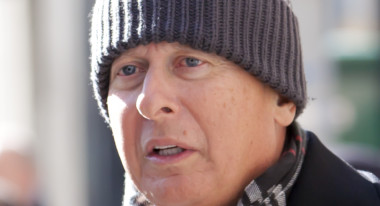Meghan Murphy: The Bag Man is your directorial debut. What made you decide to take on the task of both writing and directing a feature film?
David Grovic: I was waiting for a script that excited me. I was particularly taken by [The Bag Man]. There were a number of aspects that really appealed to me, specifically the fact that the story took place within 24 hours, so I liked the fact that, with the time being so condensed, it really increased the tension. And I liked the fact that that so much, structurally, was along the lines of Ancient Greek theater, of Greek tragedy, with the unity of time, the unity of place. So there was a lot on this script that I really liked.
MM: The film is inspired by “The Cat” written by Marie Louise von Franz. How did the story influence the film?
DG: The tale itself, of “The Cat,” is riveting and strange and dreamlike and fierce, and that is the same tone as The Bag Man. And it’s also about feminine and masculine principles being at odds. So the theme, it’s not really about man and/or woman but about masculine and feminine principles being [at odds], and the similarities between the characters, John Cusack’s character Jack and Rebecca Da Costa’s character Rivka very much match that.
MM: How was working with an up and comer like Rebecca Da Costa different from directing veteran actors like John Cusack and Robert De Niro?
DG: I think the first thing is that the actors really, to get them to come on board, people of that ilk, they really have to like the script. And the thing with all three of them is that they really really responded to the material, and they really saw the movie in a similar manner to the way that I saw it. So, we were starting from the same page. Obviously having Robert De Niro on set is an amazing experience. Bob and John were friends prior to the movie, so that was helpful. And then also prior to the movie, Bob and John met with Rebecca, so everyone was very much at ease. I think Rebecca has done… seven or eight movies prior to this. They were all very excited by the material, and really, how I like to shoot, is something that worked very well for all three of them. I like to shoot a series rather than do a take and say “cut” and then have the lighting adjusted and continuity of makeup come onto the set--I hate that. So we would, as much as possible, shoot in a series of three, or a series of five, and all the actors seemed to really appreciate that.
MM: The crime thriller has become a very popular genre and turned out some very successful movies. What do you think sets The Bag Man apart from other films of the genre?
DG: First of all, I love this genre and I think that helped to set it apart. I think the fact that the writing, the setting, the performances are not typical--as in, De Niro doesn’t play a typical crime boss. John Cusack’s character has flaws and imperfections to go with everything else. Rebecca Da Costa’s femme fatale is also set up differently, as in her Wonder Woman getup at the beginning. So I think that we played very much against stereotypical aspects. The color palette hasn’t really been seen in any noir, not compared to what we’re used to. And then, as I’ve been saying, sort of having the advantage that everything happens within 24 hours, we have a built-in tension. And I like to think that the humor, that that alleviates the tension. It is very funny, and I think that the combination really stands out.
MM: Was there anything you learned in the making of the film that will influence how you approach future projects?
DG: I think it’s very important to know one’s cast, to meet and spend time with them in advance, because by doing so it makes the whole filming process so much smoother. So that’s something I’ll definitely take with me to my next project. And then also, I had a very good crew with very few exceptions. I think that when you look at people like Clint Eastwood or the Coen brothers, they typically have the same people around for each movie. And I think that if one can get into that fortunate position of having a team who knows you backwards, I would love to have that. And I think that there’s a large percentage of this team I would love to take with me onto my next movie.
MM: Do you have any upcoming projects in the works?
DG: I’ve got a couple of scripts that I’m very fond of. One is more towards the comedy aspect, and the other is--I suppose you could probably call it a thriller. Hopefully they will come to fruition, or one of them will in the not-so-distant future.

 RSS Feed
RSS Feed
